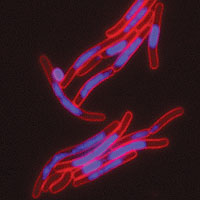FIC Proteins Send Bacteria Into Hibernation

FIC toxins modify the spatial structure of the DNA (blue) of bacteria (red: cell membrane) © University of Basel, Biozentrum
For many poisons there are antidotes which neutralize their toxic effect. Toxin-antitoxin systems in bacteria work in a similar manner: As long as a cell produces an antitoxin, thereby neutralizing a particular toxin, it grows normally. If the antitoxin is degraded, triggered for example by adverse environmental conditions, the toxin becomes effective and inhibits important cellular processes.
These systems act like a switch that interferes with bacterial growth and sends the bacteria into a state of dormancy in which they can be protected from the action of antibiotics. Prof. Christoph Dehio’s research group at the Biozentrum, University of Basel, has uncovered a new mechanism of action of toxins from the group of FIC proteins.
FIC toxin put bacteria into sleep mode
Toxin-antitoxin systems are ubiquitous in the bacterial world. The toxins usually inhibit protein synthesis or energy supply of the bacterium. Dehio’s team now first discovered such toxins among FIC proteins that can be found in all domains of life and demonstrated that they act by altering cellular DNA. The FIC toxins modify two target proteins, called topoisomerases, which give the bacterial DNA its characteristic twisted shape and monitor its spatial structure. The toxins completely shut down their activity.
“One can imagine as if FIC toxins pull the plug on topoisomerases”, explains Alexander Harms, first author and Fellowships for Excellence fellow at the Biozentrum. This rapidly leads to massive changes in the topology of cellular DNA, sending the bacteria into a kind of sleep state.
New insights into the evolution of pathogens
FIC proteins have a broad spectrum of molecular activities. Until now, research has mainly focused on FIC proteins which are injected as virulence factors by pathogenic bacteria into host cells. In their study, the scientists led by Dehio demonstrated for the first time a biological function of evolutionarily more ancestral FIC proteins, which still act within bacterial cells. This discovery could help to understand how pathogens and their tools arise in evolution.
Next, Dehio’s team aims to elucidate the evolutionary link between these original FIC toxins and the FIC proteins, which are injected as virulence factors into host cells by diverse pathogens.
Original source
Alexander Harms, Frédéric Valentin Stanger, Patrick Daniel Scheu, Imke Greet de Jong, Arnaud Goepfert, Timo Glatter, Kenn Gerdes, Tilman Schirmer & Christoph Dehio
Adenylylation of Gyrase and Topo IV by FicT Toxins Disrupts Bacterial DNA Topology
Cell Reports (2015), doi:
Further information
Prof. Dr. Christoph Dehio, University of Basel, Biozentrum, phone: +41 61 267 21 40, email: christoph.dehio@unibas.ch
Media Contact
More Information:
http://www.unibas.chAll latest news from the category: Life Sciences and Chemistry
Articles and reports from the Life Sciences and chemistry area deal with applied and basic research into modern biology, chemistry and human medicine.
Valuable information can be found on a range of life sciences fields including bacteriology, biochemistry, bionics, bioinformatics, biophysics, biotechnology, genetics, geobotany, human biology, marine biology, microbiology, molecular biology, cellular biology, zoology, bioinorganic chemistry, microchemistry and environmental chemistry.
Newest articles

Zap Energy achieves 37-million-degree temperatures in a compact device
New publication reports record electron temperatures for a small-scale, sheared-flow-stabilized Z-pinch fusion device. In the nine decades since humans first produced fusion reactions, only a few fusion technologies have demonstrated…

Innovative microscopy demystifies metabolism of Alzheimer’s
Researchers at UC San Diego have deployed state-of-the art imaging techniques to discover the metabolism driving Alzheimer’s disease; results suggest new treatment strategies. Alzheimer’s disease causes significant problems with memory,…

A cause of immunodeficiency identified
After stroke and heart attack: Every year, between 250,000 and 300,000 people in Germany suffer from a stroke or heart attack. These patients suffer immune disturbances and are very frequently…





















